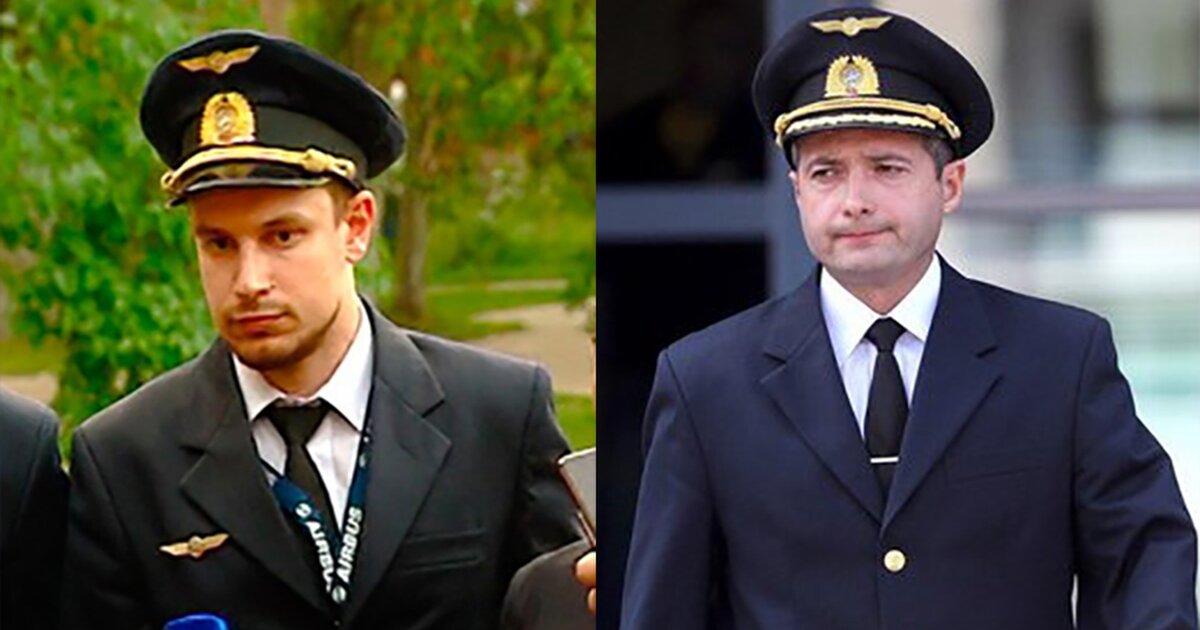
Обчень подробная и хвалебная статья с сайта Дейли Мейл.
© Associated Newspapers Captain Damir Yusupov
The heroic pilot of a Russian jet that safely crash-landed in a cornfield carrying 233 passengers after gulls got sucked into its engines climbed back into the plane to call his wife after checking the damage.
Captain Damir Yusupov brought the Ural Airlines Flight U1678 down in a cornfield yesterday with no power in either engine and with the landing gear retracted.

Speaking to the media this evening, Captain Yusupov told how not long after the dramatic landing he got back into the cockpit and called his wife to tell her what happened.
The jet was taking off from the airport at 6.10am local time bound for Simferopol in Crimea when it suffered a double bird strike, causing one engine to burst into flames and the other to stop working.
He radioed the airport asking to make an emergency landing but was forced to ditch into a cornfield a mile away after realising he was not going to make it.
The 41-year-old was hailed as a hero for safely landing the aircraft without any fatalities and leaving 23 people with only minor injuries.

In total, 23 of the 226 passengers and seven crew on board were sent to hospital for minor injuries, though only one - a 69-year-old woman - required further treatment.
The Emergencies Ministry said that 74 people asked for medical assistance after the incident. Health authorities said 23 people, including five children, were taken to the hospital, but all but one were released following check-ups.

Pilot Chesley Sullenberger successfully landed a plane on New York's Hudson River in 2009 after hitting a flock of geese. All 155 people aboard the US Airways Airbus A320 were rescued by nearby boats with few serious injuries.
Captain Yusupov, who reportedly received treatment in hospital after the crash, told the Russian media he did not consider himself a hero and that he initially thought he would have to return to the airport until the second engine failed.

'The height was not significant. Initially, there was a decision to turn around, land the plane, but when I saw that the second engine also failed.
'There was little time. But when they saw that the second engine was also failing, I had a decision - to land the plane just in front of me.
'After the evacuation of passengers I got out, went around the plane, examined the external damage, made sure that everything was at a safe distance. I returned to the cockpit and from there called my wife.
'Many people say that I am a hero, but to be honest, I don't feel like a hero at all, because I did what I had to do: saved the plane, passengers, crew.'

He also told reporters he had practised what to do in the event of an emergency landing simulations many times.
Captain Yusupov added: 'Therefore, we were mentally and professionally prepared. We have a simulator in Yekaterinburg, our own school for training flight personnel, thanks to these skills we were able to successfully land the plane.'
Flight attendant Nadezhda Vershinina said that during the evacuation the crew acted according to the instructions, adding: 'We work out such situations on simulators, there were no surprises.'
Russia's Rosaviatsiya state aviation agency chief, Alexander Neradko, said the plane was fully loaded with 16 tonnes of jet fuel.

He added: 'The crew has shown courage and professionalism and deserve the highest state awards. Just imagine what the consequences would be if the crew didn't make the correct decision.'
Yusupov's wife told Rossiya state television from their home in Yekaterinburg that he called her after landing, before she had heard about the emergency.

Passengers on board the Ural Airlines Flight reported seeing 'a flash and then a smell of smoke' as one of the engines caught fire, before the second also stopped working.

The airline said Yusupov, the son of a helicopter pilot, is an experienced pilot who has logged over 3,000 flight hours. Yusupov worked as a lawyer before he changed course and joined a flight school when he was 32. A father of four, he has flown with Ural Airlines since his graduation in 2013. He became a captain last year.

Passenger Svetlana Babina said the bird strike could be heard from inside the plane and that the engines started making 'strange noises'.
'We have to pay tribute to the pilot, in the circumstances he landed as softly as possible,' she told the RIA Novosti news agency.
'Everyone is alive! The pilot is a genius,' passenger Olga told tabloid Komsomolskaya Pravda, saying applause broke out following the landing.
'

An extraordinary drone video from channel NTV shows plane in the cornfield after the accident.
The footage shows how the captain and his copilot Georgiy Murzin, 23, used the field to act as a brake, despite the terrifying risk of the aircraft's fuel tanks bursting into flames.

Bird strikes on planes occur regularly around the world even though airports use bird distress signals, air cannons and other means to chase birds away from runways. Plane engines are designed to withstand occasional bird strikes but a collision with a flock of birds can result in serious trouble.

He said the Ural Airlines pilot probably knew in advance that a farm field was near the airport.



